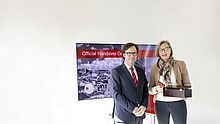If we are serious about largely abandoning fossil fuels and halting the rise in environmental costs, we must start investing today – for instance in regenerative energy sources, energy-efficient products and systems, and in energy-efficient building and refurbishment . Besides achieving the objectives defined in the energy transition itself, an energy-efficient approach has other benefits as well: if buildings use less heating and cars less fuel, consumers, companies and public institutions can all cut energy costs and reduce 2 CO2 emissions.
The National Energy Efficiency Action Plan (NAPE) and its core objectives
The National Energy Efficiency Action Plan (NAPE) defines current instruments and measures to achieve these objectives. In addition to proven instruments like funding programmes or information campaigns, NAPE consciously includes ideas for new and innovative solutions. The industrial and business sectors, private households, the transport sector and other areas are all of equal importance. The Action Plan has three main objectives: To increase energy efficiency in buildings. To establish energy efficiency as a profitable investment and a business model. To increase a sense of personal responsibility for energy efficiency.
Although Germany has made some progress in energy efficiency over recent years, the development in primary energy consumption shows that there is significant potential for further savings in all areas. Currently, energy consumption is only stagnating. So increased efforts will be needed to achieve the objectives.
Energy efficiency made in Germany
In addition, Germany is poor in natural resources, so the economic potential of energy-efficient solutions is a significant factor. This is because energy efficiency does more than just lower energy costs, it also reduces the capital outflow to countries that export fossil energies. The bottom line is more money available for investments in Germany. In turn, this strengthens the position of German companies as providers of pioneering products, systems and services for “energy efficiency made in Germany”. Energy efficiency is therefore more than a supporting pillar of the energy transition, it also possesses immense significance for the competitiveness of the German economy on international markets.
Society is also responsible for achieving the efficiency objectives.
Not only is the energy transition a question of technology, know-how and capital. The commitment of the general public also plays an essential role. We are all responsible for the success of this project, whether as politicians, businesspeople or private individuals. The success of the energy transition is decided as much by the construction of new electricity lines, gas power stations, electricity storage units and off-shore wind farms as it is in cellar boiler rooms, electronics shops and car dealerships. To ensure a successful energy transition, it is imperative to develop convincing new ideas and strategies and to appeal to all of the actors within the energy transition. Seeking to develop and establish these ideas on the efficiency market, dena initiates networks, centres of expertise and motivational campaigns, that advocate greater energy efficiency.
The Energy Efficiency Platform as an example: how dena provides support
Lively communication, individual consulting and a forward-looking debate are all needed to make the necessary information available at all of these points. dena is the right partner here. For instance, dena developed the so-called Service for Experts to provide architects, engineers, energy consultants and trades firms with a central repository containing all of the available information on energy-efficient building and refurbishment, as well as helpful tools for everyday tasks and tips for dealing with clients, therefore providing experts with the easiest possible access to all of the relevant information. After all, energy-efficient buildings will automatically become more successful if the experts provide outstanding services.
dena also runs the campaign office, ensuring scientific and organisational support for the Energy Efficiency Platform. The initiative was created by the Federal Ministry for Economic Affairs and Energy (BMWi). The aim is to exploit the expertise of the many different stakeholders as a contribution to achieving the national and European energy efficiency objectives. Business, consumer and environmental associations, trade unions, energy agencies and national and state ministries are represented on the platform.








